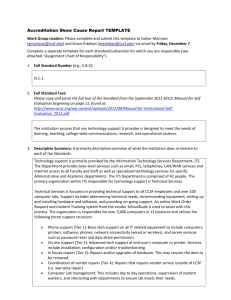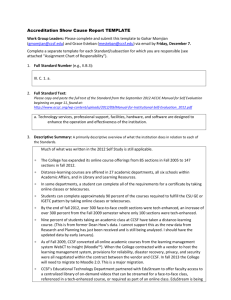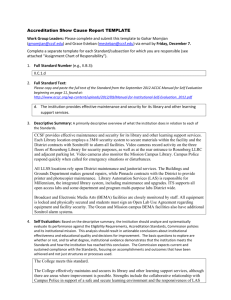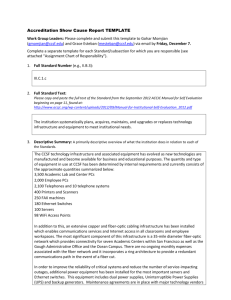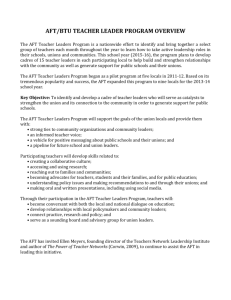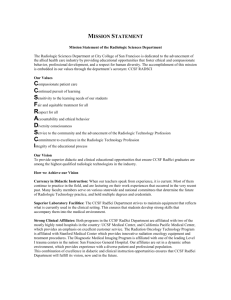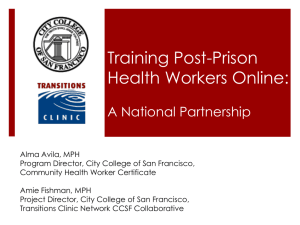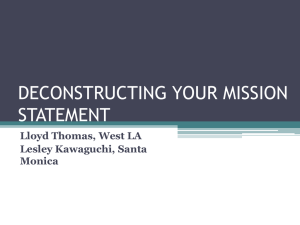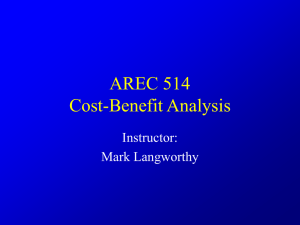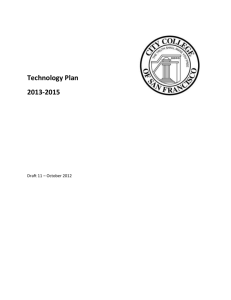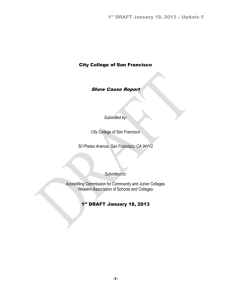Accreditation Show Cause Report TEMPLATE Work Group Leaders
advertisement
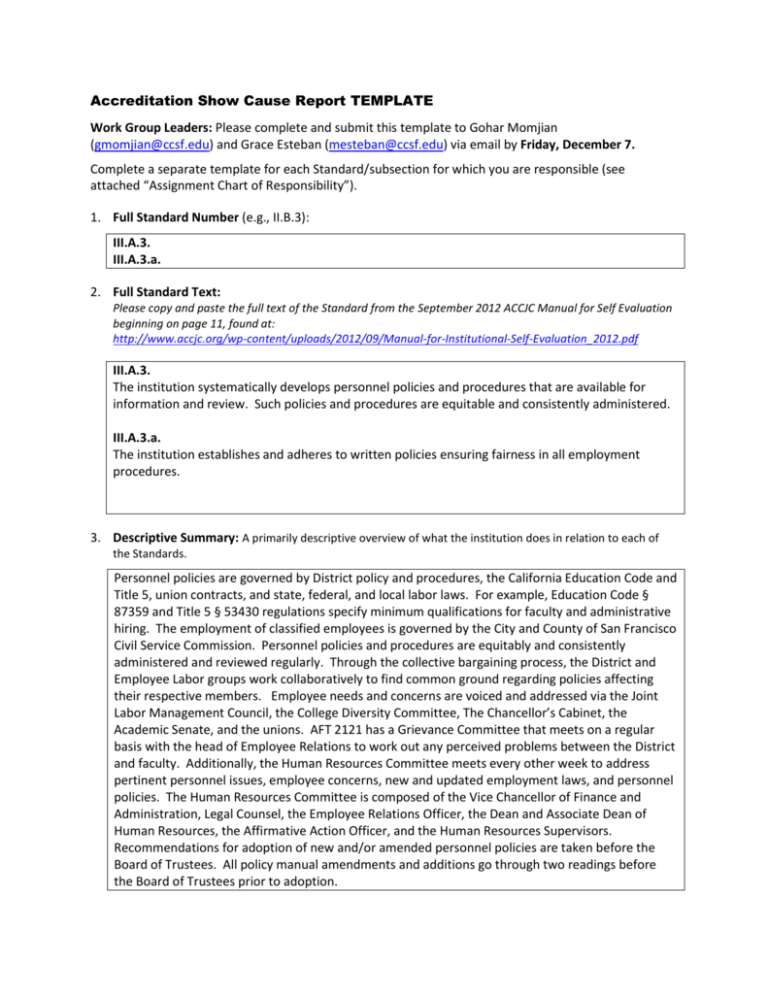
Accreditation Show Cause Report TEMPLATE Work Group Leaders: Please complete and submit this template to Gohar Momjian (gmomjian@ccsf.edu) and Grace Esteban (mesteban@ccsf.edu) via email by Friday, December 7. Complete a separate template for each Standard/subsection for which you are responsible (see attached “Assignment Chart of Responsibility”). 1. Full Standard Number (e.g., II.B.3): III.A.3. III.A.3.a. 2. Full Standard Text: Please copy and paste the full text of the Standard from the September 2012 ACCJC Manual for Self Evaluation beginning on page 11, found at: http://www.accjc.org/wp-content/uploads/2012/09/Manual-for-Institutional-Self-Evaluation_2012.pdf III.A.3. The institution systematically develops personnel policies and procedures that are available for information and review. Such policies and procedures are equitable and consistently administered. III.A.3.a. The institution establishes and adheres to written policies ensuring fairness in all employment procedures. 3. Descriptive Summary: A primarily descriptive overview of what the institution does in relation to each of the Standards. Personnel policies are governed by District policy and procedures, the California Education Code and Title 5, union contracts, and state, federal, and local labor laws. For example, Education Code § 87359 and Title 5 § 53430 regulations specify minimum qualifications for faculty and administrative hiring. The employment of classified employees is governed by the City and County of San Francisco Civil Service Commission. Personnel policies and procedures are equitably and consistently administered and reviewed regularly. Through the collective bargaining process, the District and Employee Labor groups work collaboratively to find common ground regarding policies affecting their respective members. Employee needs and concerns are voiced and addressed via the Joint Labor Management Council, the College Diversity Committee, The Chancellor’s Cabinet, the Academic Senate, and the unions. AFT 2121 has a Grievance Committee that meets on a regular basis with the head of Employee Relations to work out any perceived problems between the District and faculty. Additionally, the Human Resources Committee meets every other week to address pertinent personnel issues, employee concerns, new and updated employment laws, and personnel policies. The Human Resources Committee is composed of the Vice Chancellor of Finance and Administration, Legal Counsel, the Employee Relations Officer, the Dean and Associate Dean of Human Resources, the Affirmative Action Officer, and the Human Resources Supervisors. Recommendations for adoption of new and/or amended personnel policies are taken before the Board of Trustees. All policy manual amendments and additions go through two readings before the Board of Trustees prior to adoption. HR communicates updates and new personnel policies, procedures, and/or laws by disseminating the information to employees through institutional mailings and making the information available via the Department website. Moreover, employment policies and procedures are stated in the Policy Manual [III A-25], the SFCCD/AFT 2121 CBA [III A-2], the SFCCD/SEIU 1021 CBA [III A-19], contracts with other recognized bargaining units, and in the Faculty and Classified handbooks under sections 2.1 Equal Opportunity Statement, in the Administrative Handbook under section Unlawful Discrimination and Harassment Policy, section 3 SF City and County Charter, section 4 District Employment & Requirements 4.1-4.7, section 6 Leaves 6.1-6-14 and section 7 Professional Development 7.1-7.2, as well as posted on job announcements and on the Department website. The institution establishes and adheres to written policies that ensure informational brochures pertaining to unlawful discrimination are distributed to all employees. Employee handbooks contain as an appendix the San Francisco Community College District Policy and Procedures for Handling Complaints of Unlawful Discrimination under Title 5 § 59300 et. Seq. [III A-16, III A-17] It is the responsibility of HR and the Affirmative Action Office to orient faculty and administrative hiring committees on the hiring procedures, employment regulations, and the SFCCD/AFT 2121 CBA Article 12-Upgrading provisions [III A-2,]. The process has been improved to include samples and forms on paper screening criteria, interview questions, and teaching demonstrations. HR and the Office of Instruction hold new employee orientations once yearly to educate all incoming employees on the District’s policies and to inform employees about their rights and responsibilities. The Employee Relations Officer is responsible for ensuring that College constituents are educated on new contract language. HR is responsible for developing and distributing employee handbooks that inform employees of the principal rules, regulations, practices, and procedures essential to their role in the District. The handbooks are updated every two years. Current handbooks for Classified, Faculty, and Administrators can be found on the HR website. 3. Self Evaluation: Based on the descriptive summary, the institution should analyze and systematically evaluate its performance against the Eligibility Requirements, Accreditation Standards, Commission policies and its institutional mission. This analysis should result in actionable conclusions about institutional effectiveness and educational quality and decisions for improvement. The basic questions to explore are whether or not, and to what degree, institutional evidence demonstrates that the institution meets the Standards and how the institution has reached this conclusion. The Commission expects current and sustained compliance with the Standards, focusing on accomplishments and outcomes that have been achieved and not just structures or processes used. Self Evaluation The College meets this standard. The institution successfully ensures that all state, federal, local, and other relevant personnel policies and procedures are equitably and consistently administered and reviewed regularly. Through the collective bargaining process, the District and Employee Labor groups work collaboratively to find common ground regarding policies affecting their respective members. HR satisfactorily communicates updates and new personnel policies, procedures, and/or laws by disseminating the information to employees through institutional mailings, employee handbooks, and making the information available via the Department website. 3. Actionable Improvement Plans: Continuous quality improvement is a hallmark of institutional effectiveness. As an institution evaluates its programs and services with reference to each Standard, it identifies areas in need of change. The Commission expects the institution to identify goals related to the areas that require change and decide on the action required to meet these goals. The institution should include the required actions in improvement plans. It may not be possible for the institution to have improvement plans fully developed at the time of submission of the Institutional Self Evaluation Report. The Commission expects these actionable improvement plans to be integrated into the institution’s continuous evaluation and planning processes. none Accreditation Show Cause Report TEMPLATE Work Group Leaders: Please complete and submit this template to Gohar Momjian (gmomjian@ccsf.edu) and Grace Esteban (mesteban@ccsf.edu) via email by Friday, December 7. Complete a separate template for each Standard/subsection for which you are responsible (see attached “Assignment Chart of Responsibility”). 2. Full Standard Number (e.g., II.B.3): III.A.3.b. 2. Full Standard Text: Please copy and paste the full text of the Standard from the September 2012 ACCJC Manual for Self Evaluation beginning on page 11, found at: http://www.accjc.org/wp-content/uploads/2012/09/Manual-for-Institutional-Self-Evaluation_2012.pdf III.A.3.b. The institution makes provision for the security and confidentiality of personnel records. Each employee has access to his/her personnel records in accordance with law. 3. Descriptive Summary: A primarily descriptive overview of what the institution does in relation to each of the Standards. The institution takes its role as stewards of employee confidential files seriously by providing provisions for the security and confidentiality of personnel records. Classified and academic files are kept in secure and locked areas in HR. Personnel records are confidential and may only be viewed by authorized personnel. Academic employees may view their personnel files during regular business hours by appointment with authorized Human Resources personnel as described in the provisions of the SFCCD/AFT 2121 DBA. Classified employees may also view their personnel files upon written notice in accordance with the SFCCD/SEIU 1021 DBA. Additionally, an employee may authorize/designate a union or other representative to review the file upon written authorization as described by both AFT 2121 and SEIU 1021 collective bargaining agreements [III A-2, III A-19]. Administrators and classified employees not represented by SEIU 1021 have equivalent rights to inspect their personnel files, as outlines in their respective employee handbooks. For all employees, Education Code and Labor Code provisions are assured. In accordance with the SFCCD/SEIU 1021 CBA, the SFCCD/AFT 2121 CBA, and District policy, there must be only one official District personnel file for each academic and classified employee. Each personnel file consists of District employment records, educational advancement records, and other work experience that relates to employee service. The following items are considered part of a classified and academic personnel file but are maintained separately: time rolls, attendance records, payroll records, work orders, TB records, history cards, salary cards, credential records, schedule files, and assignment files. The District may add similar categories of routine personnel recordkeeping as long as both AFT 2121 and SEIU 1021 are notified respectively as described in the contracts. Medical records and investigative reports are filed separately and secured in the same manner as previously noted records. An outline, password-protected database called Web4 allows employees access to certain types of information. Employees are able to access and update some of their personal information, such as payroll information, benefits and deductions; sick days credited and used, and tax withholding, via their online account on Web4. Additionally, the ITS Department takes great measures within its technical infrastructure to secure employment records in the CCSF Banner information system. Each user has a unique Oracle logon and password. Within CCSF Banner, each user is given limited permissions to view or update only specific areas appropriate for his or her job duties. Moreover, only select staff members in the administrative area of the College are granted access to the CCSF Banner information system. An exit interview process was implemented in Spring 2011including an exit interview and employee exiting checklist, supervisory and/or key departmental sign-offs, and an employee acknowledgement. The next stage, scheduled for implementation in Spring 2012, is automation of the exit checklist, including electronic routing and electronic sign-offs. 3. Self Evaluation: Based on the descriptive summary, the institution should analyze and systematically evaluate its performance against the Eligibility Requirements, Accreditation Standards, Commission policies and its institutional mission. This analysis should result in actionable conclusions about institutional effectiveness and educational quality and decisions for improvement. The basic questions to explore are whether or not, and to what degree, institutional evidence demonstrates that the institution meets the Standards and how the institution has reached this conclusion. The Commission expects current and sustained compliance with the Standards, focusing on accomplishments and outcomes that have been achieved and not just structures or processes used. The College meets this standard. Security and confidentiality of personal records is diligently provided, primarily through locked files of paper-copy documents in HR with only authorized personnel allowed viewing right. Employee access is provided by appointment, and limited information is available online via password protection. A clearly documented exit interview procedure has been implemented; including an exit interview, and an automated employee exiting checklist and employee acknowledgment. 3. Actionable Improvement Plans: Continuous quality improvement is a hallmark of institutional effectiveness. As an institution evaluates its programs and services with reference to each Standard, it identifies areas in need of change. The Commission expects the institution to identify goals related to the areas that require change and decide on the action required to meet these goals. The institution should include the required actions in improvement plans. It may not be possible for the institution to have improvement plans fully developed at the time of submission of the Institutional Self Evaluation Report. The Commission expects these actionable improvement plans to be integrated into the institution’s continuous evaluation and planning processes. Automation of the exit interview is scheduled for Spring 2013.
